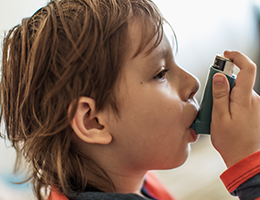
When a child has asthma, the most obvious effects are physical. But the disease can have an emotional impact as well. Asthma can leave a child feeling physically limited and socially isolated.
That's where your role as a parent comes in. In addition to working with a doctor to make sure your child's asthma is well controlled, you'll want to offer your child understanding and support. These tips can help.
Talk about it. Asthma can be scary, and kids may hear about people dying from the disease. Regularly make an effort to talk with your child about what they are thinking and experiencing. Have you noticed signs that they are feeling despair or hopelessness over their illness and future? Encourage them to talk about these feelings. It might help to begin conversations with statements such as, “If I were you, I think I would be feeling…” or “I have read that many kids with this disease feel lonely and sad. How do you feel?”
Encourage participation. Kids with asthma should be encouraged to take part in sports and other normal activities as much as possible, according to the American Academy of Pediatrics. Even children with a serious chronic disease can enjoy the benefits of taking part in safe and appropriate physical activity.
Children with asthma can usually participate in sports, although they may have to carefully follow their doctor's directions to take their medicine before exercising.
If you're not sure a particular activity is safe, seek a doctor's advice.
Learn and educate yourself. Children need knowledge about their asthma—knowledge that can help them gain a sense of control and better handle their fears and concerns. Help your child learn as much about their illness as possible. Help your child find information that's geared toward their age group, and learn together.
It might also be helpful to introduce your child to an adult who has successfully adjusted to living with asthma.
Give responsibility. As kids get older, they should be given more responsibility for managing their asthma, advises the American Lung Association (ALA). Children benefit from being empowered to take control and make healthy choices as soon as they are developmentally ready. Talk to your doctor and your child about setting specific management goals. Follow up on these at each visit, since these goals will change as your child grows.
Learning to control asthma can help kids build confidence.
A note about teens: Teens are very sensitive to anything that makes them feel different from their friends. That could include taking asthma medicines. Children who have been responsibly managing their asthma for years may start to have more symptoms because they aren't taking their medicine like they should. You may be able to help by encouraging your teen to talk about their feelings, according to the ALA.
Talk to teachers. By working with officials at your child's school, you can help build a supportive environment, keep asthma controlled and encourage full participation in activities. Ensure that your child's teachers, school counselors and coaches are aware of your child's asthma and treatment plan. Be sure they know what to do if your child has an asthma attack.
Ask for help. Finally, consult your child's doctor if you have concerns or questions about anything related to your child's asthma or other health issues.
Reviewed 10/29/2024